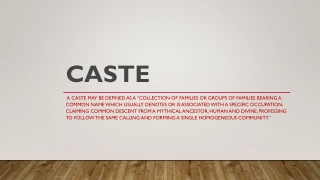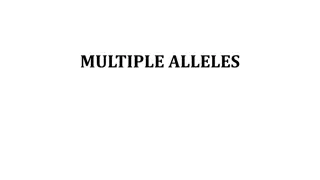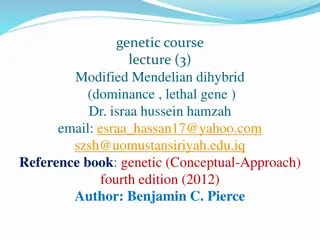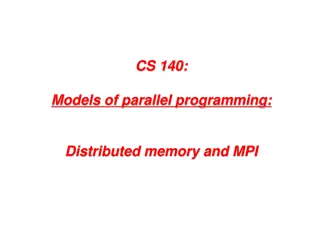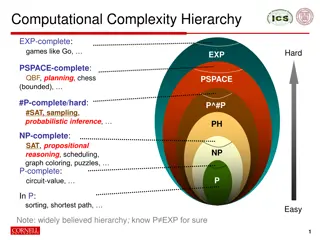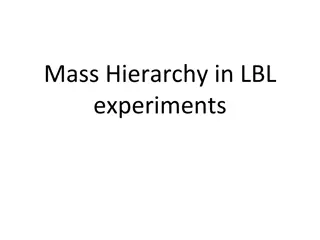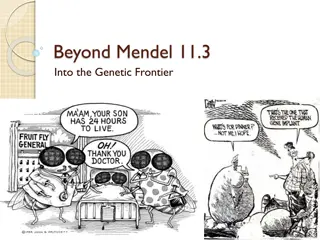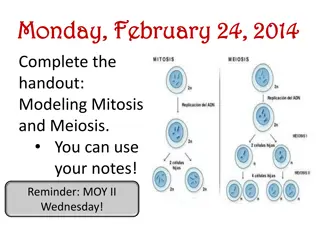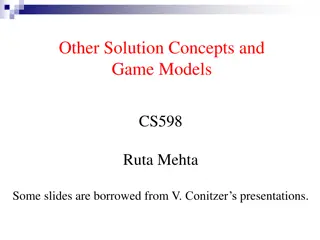Overview of Caste System in India
The caste system in India is a social structure defined by hereditary groups, each with specific occupations, rules, and traditions. Membership is based on birth, leading to a rigid hierarchy and limited mobility between castes. Endogamy, occupation, commensality, and purity are key features that sh
0 views • 17 slides
ABUSE OF DOMINANT POSITION
Carishma Singh explains how abuse of dominant position (Section 4) is defined under the Competition Act, emphasizing that dominance alone is not anti-competitive, but coupled with abusive conduct, it can harm competitors, consumers, and markets. The law applies to both private and government entitie
0 views • 20 slides
Introduction to Operating Systems
Explore the concepts of address translation, Translation Lookaside Buffer (TLB), TLB usage in modern processors, TLB invalidate mechanisms, and hardware design principles related to memory hierarchy using examples from the Intel i7 processor. Understanding the trade-offs and costs associated with TL
0 views • 30 slides
Understanding Measures of Prejudice in Research: Social Dominance Orientation, Stereotype Content Model, and More
Explore methods for measuring prejudice in research, including explicit and implicit attitude measures, Social Dominance Orientation (SDO) scale, and Symbolic (Modern) Racism Scale. Learn about the aims of research, selecting appropriate methods, and theoretical frameworks to apply.
0 views • 12 slides
Connecting the Future Soldier with Technological Resources for Information Dominance
Panel discussion on the integration of computer hardware, enterprise software, and solutions for the future soldier's information dominance. Overview of ITES-3S and RS3 contracts providing IT support and professional services for the Army. Comparison of ACCESS and ITES-4S focus areas and evaluation
0 views • 6 slides
Understanding Incomplete and Co-dominance in Genetics
Phenotypes and genotypes play crucial roles in understanding incomplete dominance and co-dominance. In incomplete dominance, alleles blend to produce a new phenotype, while in co-dominance, both alleles are expressed equally. Examples and problems illustrate these concepts further, aiding in genetic
0 views • 12 slides
Understanding Maslow's Hierarchy of Needs in Humanistic Psychology
Humanistic psychologists, such as Abraham Maslow and Carl Rogers, viewed personality as a quest for self-determination and self-realization. Maslow's hierarchy of needs illustrates how individuals progress from fulfilling basic physiological needs to achieving self-actualization and self-transcenden
0 views • 25 slides
Understanding Ecosystem Organization and Hierarchy
Explore the intricate relationships within ecosystems through the study of organization and hierarchy. From individual organisms to complex communities, learn how biotic and abiotic factors shape these environments. Gain insights into the levels of ecosystem organization, from single organisms to in
5 views • 15 slides
Exploring Power Dynamics in Performance: Status and Authority Depiction
Dive into portraying power and status in theatre performances by analyzing a scene where characters interact in a hierarchy. Explore how gestures, dialogue, and relationships can convey dominance or subservience. Reflect on character dynamics and suggestions for enhancing performances based on statu
3 views • 57 slides
Understanding Genetic Markers in Molecular Mapping
Genetic markers play a crucial role in gene mapping within molecular biotechnology. They are fragments of DNA associated with specific genomic locations, aiding in identifying DNA sequences and analyzing genetic variation. Various types of genetic markers such as RFLP, SSR, and SNP offer insights in
1 views • 26 slides
Analytic Hierarchy Process (AHP) for Sustainable Smart Industry Curriculum Development
Intelligent Decision Support Systems and the Analytic Hierarchy Process (AHP) play a crucial role in the development of a Master's Degree Program in Industrial Engineering for Thailand's Sustainable Smart Industry. AHP, developed by Thomas Saaty, aids in measuring intangible factors through paired c
0 views • 23 slides
Understanding Hierarchy Change Processes in Tatmeen
Discover the hierarchy change processes within Tatmeen's distribution system involving packaging, serialization, and association of products at different levels. Learn about the modes of hierarchy change - Pack, Unpack, and Unpack All - and how they impact the distribution process to ensure efficien
0 views • 68 slides
Aristotle's Justification of Hierarchy and Republican Aspects of Citizenship
Aristotle's concept of citizenship involves a hierarchical structure where ruling and being ruled in turn is essential. He justifies this hierarchy by emphasizing the advantageous nature of ruling and being ruled. However, his views on citizenship in Greek city-states were limited to adult males, hi
3 views • 6 slides
Understanding Multiple Alleles in Genetics
Explore the concept of multiple alleles in genetics through examples like pea color inheritance and human blood types. Learn how multiple alleles create various phenotypes and genotypes, illustrating concepts of dominance, recessiveness, and co-dominance in genetic inheritance.
0 views • 15 slides
Understanding Injections and Infusions in Healthcare
Determining the hierarchy of injections and infusions is crucial in medical coding and billing. Infusions are prioritized over pushes, which are prioritized over injections. This hierarchy should be followed for accurate reporting and coding. IV Infusion Therapy involves administering fluids or medi
0 views • 57 slides
Understanding Chomsky Hierarchy in Language Theory
Explore Chomsky Hierarchy in language theory, including different types of languages, grammars, and automata. Learn how to prove if a language is regular, context-free, recursive, or recursively enumerable. Understand the closure properties of regular, context-free, recursive, and recursively enumer
2 views • 10 slides
Strategies for Interim Injunctions in Abuse of Dominance Cases
This mini-series event focuses on strategies and tips for interim injunctions in abuse of dominance cases, chaired by Sir Richard Aikens. Various perspectives are explored, including a claimant's viewpoint by Aaron Khan, document requirements by David Heaton, and insights from Fergus Randolph QC as
2 views • 23 slides
Overview of Grammar Types and Chomsky Hierarchy
The four types of grammars are General, Context-Sensitive, Context-Free, and Linear grammars, each recognizing a specific set of languages. Chomsky Hierarchy categorizes these grammars into four levels, indicating subsets of languages they can recognize. Context-free grammars have specific productio
0 views • 17 slides
Understanding Dominance in Genetics: The Role of Alleles and Phenotypes
Dominance in genetics refers to the interaction of alleles at the same gene locus. Complete dominance occurs when one allele masks the effect of another in a heterozygous genotype, leading to a phenotype indistinguishable from the dominant homozygote. This concept is crucial for predicting genetic o
1 views • 18 slides
Redesigning the GPU Memory Hierarchy for Multi-Application Concurrency
This presentation delves into the innovative reimagining of GPU memory hierarchy to accommodate multiple applications concurrently. It explores the challenges of GPU sharing with address translation, high-latency page walks, and inefficient caching, offering insights into a translation-aware memory
1 views • 15 slides
Understanding Coronary Artery Anatomy and Dominance
Explore the intricate details of coronary artery anatomy with a focus on the right and left coronary arteries, as well as variations such as large right dominance, small right dominance, co-dominance, and left dominance. Learn about the importance of understanding these structures in relation to car
0 views • 8 slides
Understanding Resilience Through Maslow's Hierarchy of Needs
Exploring the concept of resilience through Abraham Maslow's Hierarchy of Needs, which outlines the progression of human needs from basic physiological requirements to self-actualization and intrinsic values. Recognizing the importance of interpersonal relationships in fostering resilience, especial
0 views • 12 slides
Understanding the Feudal System: Lords, Serfs, and Hierarchy
The Feudal System was a social hierarchy where the king held control, and peasants did the work at the bottom. Lords owned the land while serfs worked on it. Explore the differences between a lord and a serf, how the system provided order and stability, and the new form introduced in England. Join a
1 views • 5 slides
Understanding Maslow's Hierarchy of Needs Through "Homeless to Harvard" Play-doh Activity
Explore the story of "Homeless to Harvard" by creating Play-doh examples of how David's needs were met at each level of Maslow's Hierarchy. Use quoted text evidence to explain the fulfillment of physiological, safety, love/belonging, esteem, and self-actualization needs. Follow instructions to photo
0 views • 7 slides
Understanding Organisational Structure and Hierarchy in the Workplace
Organisational structure plays a vital role in defining how a business operates, encompassing elements like hierarchical arrangements, functional areas, and chain of command. Hierarchy within an organization determines accountability and communication channels, while the span of control impacts supe
1 views • 16 slides
Understanding Social Hierarchies in Animal Behavior
Social behavior in animals involves living in social groups, establishing social hierarchies, and exhibiting dominance behaviors. Animals have developed various signals and behaviors to interact successfully within these groups. Social hierarchies offer advantages such as increased chances of surviv
1 views • 20 slides
The Mitigation Hierarchy in the World Bank Environmental & Social Framework Overview
The content discusses the Management of risks and impacts within the World Bank's Operational Policies and Bank Procedures, highlighting the incorporation of the Mitigation Hierarchy in the Environmental & Social Framework. It addresses key elements, drivers, challenges, and the need for clarity in
1 views • 17 slides
Understanding Dominance Rule in Data Analysis
Dominance rule in data analysis involves identifying and attributing information to dominant observations that account for a majority of a measure. Concentration ratios, like Herfindahl Indices, can reveal dominant players in various sectors. Dramatic changes in time series data may also indicate do
4 views • 6 slides
Introduction to Java GUI with Swing Part I
Understanding Java GUI components with Swing and AWT, top-level containers, containment hierarchy concepts, menu bars, content panes, and component hierarchy. Exploring various container classes and their roles in GUI programming.
1 views • 64 slides
Amoeba Cache: Adaptive Blocks for Memory Hierarchy Optimization
The Amoeba Cache introduces adaptive blocks to optimize memory hierarchy utilization, eliminating waste by dynamically adjusting storage allocations. Factors influencing cache efficiency and application-specific behaviors are explored. Images and data distributions illustrate the effectiveness of th
0 views • 57 slides
UFIRST Roles and Organizational Hierarchy Overview
Explanation of various roles within UFIRST system, including Grants Administrators, Approvers, Workflow Administrators, and Study Staff. Details on access levels, training requirements, and organizational hierarchy structure within UF. Key personnel roles and responsibilities outlined for effective
0 views • 9 slides
Understanding Parallel Programming and Memory Hierarchy in Triton
Explore the concepts of parallel programming, distributed memory, and memory hierarchy in the context of Triton, focusing on technology trends, processor clock speeds, machine architecture, and memory organization at different levels (chip, node, system).
0 views • 23 slides
Insights into Computational Complexity Hierarchy and SAT Algorithms
The computational complexity hierarchy explores classes of problems like EXP-complete, PSPACE-complete, and more. SAT algorithms, such as local search methods and survey propagation, offer new insights into practical complexity. Discover the interplay between tractable and intractable structures in
0 views • 12 slides
Understanding Caches and the Memory Hierarchy in Computer Systems
Delve into the intricacies of memory hierarchy and caches in computer systems, exploring concepts like cache organization, implementation choices, hardware optimizations, and software-managed caches. Discover the significance of memory distance from the CPU, the impact on hardware/software interface
0 views • 84 slides
Insights into Mass Hierarchy Determination in Long-Baseline Neutrino Experiments
Combining appearance probabilities of electron and anti-electron neutrinos in long-baseline experiments can help determine the mass hierarchy, with ongoing experiments collecting significant data by 2020. Analyses point to CP violation possibilities, with updates expected in Neutrino2016. The capabi
0 views • 6 slides
Understanding Genetic Inheritance Patterns and Human Blood Types
Explore how genes can be inherited based on patterns such as Mendel's dominance, incomplete dominance, co-dominance, and multiple alleles. Dive into the complexities of human blood types controlled by one gene with three alleles - A, B, and O, resulting in four phenotypes and six genotypes. Learn ho
0 views • 19 slides
Understanding Monohybrid Crosses: Incomplete Dominance and Codominance
Explore the concepts of incomplete dominance and codominance through monohybrid crosses. Learn how alleles interact to produce unique phenotypes in plants and horses. Discover the outcomes of crosses between homozygous dominant, heterozygous, and homozygous recessive individuals. Gain insights into
0 views • 7 slides
Understanding Genetics: Mendel's Experiments and Inheritance Patterns
Delve into the world of genetics through Mendel's groundbreaking experiments with pea plants, exploring traits inheritance, Punnett squares, dominant and recessive alleles, incomplete dominance, and co-dominance. Gain insights into how traits are passed from parents to offspring and predict offsprin
0 views • 9 slides
Game Theory Concepts and Models in Strategic Decision-Making
Exploring various solution concepts and game models in the realm of game theory, this presentation delves into topics such as Nash equilibrium, dominance, dominant strategy equilibrium, mixed strategies, and iterated dominance. It discusses how players decide on particular equilibria, possible solut
0 views • 39 slides
Character Analysis in "The Doll's House" by Katherine Mansfield
Kezia, the youngest sister in "The Doll's House" by Katherine Mansfield, is portrayed as a strong-willed and compassionate character who defies social norms by welcoming the Kelvey sisters to see her dollhouse. Despite being advised against associating with them, Kezia shows kindness and non-judgmen
0 views • 15 slides
